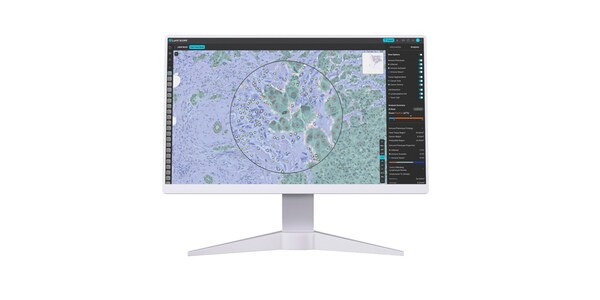Lunit and the Japan National Cancer Center Hospital East Partner in AI Pathology to Advance Precision Oncology
By PRNEWSWIREPublished : May 31, 2023 - 00:21

- Collaborative research with Japan's largest oncology practice shows Lunit SCOPE's potential in predicting clinical outcomes for rectal cancer
SEOUL, South Korea, May 30, 2023 /PRNewswire/ -- Lunit (KRX:328130.KQ), a global provider of AI-powered cancer diagnostic solutions, today announced collaboration with the National Cancer Center Hospital East (NCCHE) to evaluate and validate its AI pathology solution for tissue data analysis.
This partnership aims to leverage the capabilities of Lunit SCOPE, an AI-biomarker platform, in analyzing Immunohistochemistry and H&E tissue slide data from various clinical trials, including NCCHE's molecular profiling projects such as SCRUM-Japan MONSTAR-SCREEN. The primary objective is to assess AI's ability to accurately read known biomarkers such as HER2 and PD-L1, as well as to evaluate the performance of emerging biomarkers like immune phenotype, as read by Lunit SCOPE IO, in predicting clinical outcomes in multiple treatment settings.
"Our collaborative research using Lunit's outstanding AI analysis technology has demonstrated that in addition to assisting in pathological diagnosis, a single slide can predict a response based on biological mechanisms. Working with Lunit and the SCRUM project will bring a new approach to cancer treatment," said the principal investigator of SCRUM-Japan MONSTAR-SCREEN project, Dr. Takayuki Yoshino of the National Cancer Center Hospital East (Kashiwa City, Chiba Prefecture). "We are pleased to collaborate with Lunit and look forward to working towards our goal of leading to further personalized medicine for cancer patients around the world."
This collaboration's first set of findings will be unveiled at the American Society of Clinical Oncology (ASCO) annual meeting. The finding includes the analysis of AI-assessed tumor-infiltrating lymphocyte (TIL) density in the tumor microenvironment of microsatellite stable (MSS) locally advanced rectal cancer (LARC) samples. The study shows a strong correlation between changes in TIL density during preoperative chemoradiotherapy (CRT) and pathologic complete response (pCR) rate of MSS LARC patients. This finding underscores the potential of tumor microenvironment (TME) analysis by Lunit SCOPE IO to predict favorable outcomes.
Lunit and NCCHE remain committed to conducting studies to further validate the findings and to explore AI analysis in additional treatment settings. Additional results and validations from ongoing studies will be shared at future congresses, ensuring transparency and driving further AI-powered tissue data analysis advancements.
"We are delighted to partner with the National Cancer Center Hospital East in the validation of our Lunit SCOPE suite, marking a significant step towards advancing precision oncology and improving optimized patient treatment," said Brandon Suh, CEO of Lunit. "Through this collaboration, we aim to unlock the full potential of Lunit SCOPE to provide an accurate and efficient analysis of tissue slide data. Our goal is to equip clinicians and researchers with powerful tools that can transform oncology practices, drive more informed clinical decision-making and ultimately improve patient outcomes."
About Lunit
With AI, Lunit aims to 'conquer cancer,' one of the leading causes of death worldwide. Lunit is an AI software company devoted to developing AI solutions for precision diagnostics and therapeutics, to find the right diagnosis at the right cost, and the right treatment for the right patients. Lunit, a portmanteau of 'learning unit,' is a deep learning-based medical AI company devoted to developing advanced medical image analytics and data-driven imaging biomarkers via cutting-edge technology.
Founded in 2013, Lunit has been acknowledged around the world for its advanced, state-of-the-art technology and its application in medical images. Its technology has been recognized at international AI competitions surpassing top companies like Google, IBM, and Microsoft. As a medical AI company with a focus on clinical evidence, the company's findings are presented in major peer-reviewed journals such as the Journal of Clinical Oncology and JAMA Network Open, and global conferences including ASCO and AACR.
After receiving FDA clearance and the CE Mark, Lunit INSIGHT CXR and MMG are clinically used in approximately 2,000 hospitals and medical institutions across more than 40 countries. Lunit SCOPE PD-L1 is CE marked in Europe and has not been cleared or approved by the US Food and Drug Administration (FDA) and is intended for Research Use Only. Lunit is headquartered in Seoul, South Korea with offices and representatives around the world.
About Lunit SCOPE
Lunit SCOPE is a suite of AI-powered software that analyzes tissue slide images for digital pathology and AI biomarker development, with the aim of optimizing workflow and facilitating more accurate and predictive clinical data for clinicians and researchers.
Lunit SCOPE platform offers multiple tissue analysis AI software products and assays that can streamline digital pathology workflow and diagnostics, as well as enhance the drug development process.
Lunit SCOPE IO analyzes the tumor microenvironment (TME) based on H&E analysis and provides AI-based predictive clinical outcome information. In addition, AI-driven Immunohistochemistry (IHC) slide analysis services are offered, through products such as Lunit SCOPE PD-L1, Lunit SCOPE HER2, Lunit SCOPE ER/PR, and others.


















![[KH Explains] Hyundai's full hybrid edge to pay off amid slow transition to pure EVs](http://res.heraldm.com/phpwas/restmb_idxmake.php?idx=652&simg=/content/image/2024/04/18/20240418050645_0.jpg&u=20240418181020)

![[Today’s K-pop] Zico drops snippet of collaboration with Jennie](http://res.heraldm.com/phpwas/restmb_idxmake.php?idx=642&simg=/content/image/2024/04/18/20240418050702_0.jpg&u=)